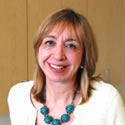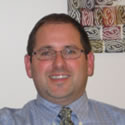| Students, Stress, and Sickness: Are There More Problems and, If So, Why? |

Judith Olson-Hammer MS - Director of Educational Services for Students at Case Western Reserve University |

Richard B. Pazol Psy.D. - Director of Counseling and Coordinator of Assessment Services, University Health and Counseling Services at Case Western Reserve University |
Friday October 20, 2017
12:30-1:30 p.m.
Dampeer Room
Kelvin Smith Library *
Case Western Reserve University
Dear Colleagues:
This week's discussion topic comes out of both the headlines and the classroom. The New York Times Magazine this week asks, "Why Are More American Teenagers Than Ever Suffering From Severe Anxiety?" Meanwhile, many professors perceive that, over recent years, there has been a significant increase in the number of students with Accommodation Memos, explaining that the student needs more than the scheduled class time or a separate environment for exams, or should be allowed to miss classes, or some other adjustment.
So, what's going on? How big a change have the university staff who observe it most directly, in the ESS and Counseling offices, seen? Is it more due to anxiety or other problems? Is any change more due to students with more troubles or to diagnosis becoming more common? How would they answer the Times' question, and what can the university do about that? Join us as I pose some questions to our experts, and then join in with your own questions.
All best regards,
Joe White
Luxenberg Family Professor of Public Policy and Director, Center for Policy Studies
About Our Guests
As the Director of Educational Services for Students at Case Western Reserve University, Judy Olson-Hammer works with a team of great professionals who focus on academic support, disability resources, and spoken English programs. She also serves as a writing instructor for the SAGES program. She has her TESOL certification to enhance her work with international students both at CWRU and at Tri-C. She has recently completed a graduate degree in ministry with a focus on pastoral counseling. On the weekends, she spends time with her beloved husband Matty, riding with him on their Harley and playing with their therapy dogs Lulu and Strudel!
Dr. Richard B. Pazol is the Coordinator of Assessment for the University Counseling Service at Case Western Reserve University and a Clinical Instructor in CWRU's Department of Psychological Sciences, Dr. Pazol conducts assessments of undergraduate and graduate/professional students and trains and supervises licensed psychologists and Ph.D. graduate trainees in assessment.
Dr. Pazol earned his Bachelor of Arts in Psychology from the University of Michigan and his Doctorate of Psychology (Psy.D.) from The Illinois School of Professional Psychology, Chicago. He completed his internship at the Cleveland VA Medical Center.
Where We Meet
The Friday Public Affairs Lunch convenes each Friday when classes are in session, from 12:30 p.m. to 1:30 p.m. Our programs are open to all and no registration is required. We usually meet in the Dampeer Room of Kelvin Smith Library.
* Kelvin Smith Library requires all entrants to show identification when entering the building, unless they have a university i.d. that they can magnetically scan. We are sorry if that seems like a hassle, but it has been Library policy for a while in response to security concerns. Please do not complain to the library staff at the entrance, who are just doing their jobs.
The Dampeer Room is on the second floor of the library. If you get off the elevators, turn right, pass the first bank of tables, and turn right again. Occasionally we need to use a different room; that will always be announced in the weekly e-mails.
Parking Possibilities
The most convenient parking is the lot underneath Severance Hall. We regret that it is not free. From that lot there is an elevator up to street level (labeled as for the Thwing Center); it is less than 50 yards from that exit to the library entrance. You can get from the Severance garage to the library without going outside. Near the entry gates - just to the right if you were driving out - there is a door into a corridor. Walk down the corridor and there will be another door. Beyond that door you'll find the entrance to an elevator which goes up to an entrance right inside the doors to Kelvin Smith Library.
Schedule of Friday Lunch Upcoming Topics and Speakers:
October 27: Patenting Pot. With Craig A. Nard J.D., L.L. M., J.S.D., Galen A. Roush Professor of Law and Director, Spangenberg Center for Law, Technology and the Arts.
November 3: Cleveland's Muslim Community: History and Challenges. With Ramez Islambouli, Lecturer of Arabic and Islam; Adjunct Professor of Islamic Law; and President, Uqbah Mosque Foundation.
November 10: Lead Poisoning in Cleveland: Why, After All These Years? With Dorr Dearborn MD, Ph.D., Mary Ann Swetland Professor Emeritus and Department Chair Emeritus, Department of Environmental Health Sciences.
November 17: Digging Into Football and Voting With Data. With Andrew Healy Ph.D., Professor of Economics, Loyola Marymount University and Senior Strategist for Player Personnel, Cleveland Browns.
November 24: Thanksgiving Break
December 1: TBA
December 8: Environmental Policy in the Pruitt EPA. With Catherine J. LaCroix J.D., Adjunct Professor of Law. |
|
October 16, 2017
If you would like to reply, submit items for inclusion, or not receive this weekly e-mail please send a notice to: padg@case.edu
Upcoming Events
America's Immigration Policy Fiasco
The Frank J. Battisti Memorial Lecture, with Douglas S. Massey, Henry G. Bryant Professor of Sociology and Public Affairs and Director of the Office of Population Research at Princeton University
, Thursday, October 19, 2017, 4:30 p.m. - 5:30 p.m., CWRU School of Law, Moot Courtroom (A59), 11075 East Blvd., Cleveland, Ohio 44106.
Much of the debate about immigration has ignored what actually happened. Professor Massey's research with colleagues,
gathered from communities throughout Mexico since 1987, indicates that tighter, militarized enforcement at the U.S. - Mexico border backfired. A circular flow of male workers back and forth was transformed because the costs and risks of
crossing the border rose. "Migrants naturally minimized border crossing," he explains, "not by remaining in Mexico but by staying in the United States" - and bringing their families. He will discuss the policy responses that make
sense given both that pattern and demographic changes within Mexico.
Professor Massey is a member of the National Academy of Sciences and American Academy of Arts and Sciences, and has served as president of the American Sociological Association and the Population Association of America.
S |
M |
T |
W |
T |
F |
S |
1 |
2 |
3 |
4 |
5 |
6 |
7 |
8 |
9 |
10 |
11 |
12 |
13 |
14 |
15 |
16 |
17 |
18 |
19 |
20 |
21 |
22 |
23 |
24 |
25 |
26 |
27 |
28 |
29 |
30 |
31 |
|
|
|
|

|
|



